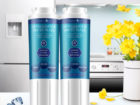There are different types of water filters which can bring you safe and clean water. You can choose from reverse osmosis water filters, distilled water filters, ceramic water filters, ion exchange water filters, ultra-violet (UV) water filters and carbon water filters based on your needs. Let’s have a look at their advantages and disadvantages.
Reverse Osmosis Water Filters
RO systems use a semipermeable membrane that only allows only certain particles, molecules and ions through. Various types of contaminants such as fluoride, bacteria, heavy metals and nitrates will be eliminated. However, this system wastes a lot of water, costing 10x more wastewater than filtered water. In addition, RO filters also remove healthful minerals from our water, like sodium, calcium, copper, zinc, manganese and iron. According to the World Health Organization, low total dissolved solvents (TDS) are not good for health. Minerals present naturally in the water cannot be substituted by food or supplements and a lack of minerals will lead to serious deficiencies or diseases long term.

Pros:
Removes flouride easily
Removes heavy metals
Improves taste
Cons:
Wastes a lot of water
Removes all dissolved solids including beneficial minerals
Doesn’t remove chlorine or chemicals, pesticides or drugs
Distilled Water Filters
A home water distiller allows you to enjoy the purest form of water by creating water vapor and cooling it into liquid. During this process, water distillers are powerful in removing and killing containments and pathogenic bacteria. However, some volatile contaminants will be carried up with the water vapor and end up in the end result. More importantly, all minerals are lost in distilled water which will cause serious health issues.

Pros:
No need for filter replacement
Low-cost and sustainable
Great at removing contaminants and pathogenic bacteria
Cons:
Produces demineralized water – which can cause diseases and leave the body in a dehydrated state
Filter process Is slow
Volatile contaminants cannot be removed, such as chlorine
Ceramic Water Filters
Ceramic has a small and complex pore structure, which makes it an ideal filter medium for drinking water. These tiny pores allow water to flow through whilst blocking contaminants bigger than the pore size. In this way, ceramic filters effectively remove larger microbial cysts, protozoa and bacteria, but viruses are not blocked due to their small sizes. They are often treated with silver to kill bacteria and prevent mold and algae from breeding in the water.

Pros:
Relatively affordable and effective
Filters out microbial cysts, protozoa and bacteria
No need for filter replacements
Cons:
Not able to remove viruses and small chemicals
Slow flow rate
Requires regular cleaning
Prone to cracking and leaks
Ion Exchange Water Filters
Ion exchange water filters are one of the most common methods for reducing hardness in water. The ion exchange process percolates water through tiny plastic bead-like spherical resin materials (ion-exchange resins), trapping of ions whilst releasing of other ions. The two most common ion-exchange methods are softening and deionization. This process can be used to remove heavy metal ions from water (such as mercury (Hg), cadmium (Cd), arsenic (As), chromium (Cr), thallium (Tl), and lead (Pb)) and replacing them with safer ions such as potassium. The ion exchange filtered water is soft and perfect for making good coffee. However, this filter technology will not remove particles, pyrogens or bacteria.

Pros:
Fast flow rate
Effectively makes water soft
Relatively low initial capital investment
Cons:
High running cost long-term
Resins can rapidly generate and culture bacteria
Does not filter pathogenic bacteria or viruses
Ultra-Violet (UV) Water Filters
UV water filters use an ultraviolet lamp light of high frequency to irradiate water and effectively kill all living microorganisms in it. But they don’t eliminate particles or any chemical containments at all. If the water holds a large number of parasites, bacteria and viruses, the UV light may be absorbed and or scattered allowing nasties to get through alive. UV filters are usually used at the end of a complete water filtration system, such as after an RO system.

Pros:
Kills all living microorganisms
Great for rainwater, well water and groundwater
Cons:
Expensive
The bulb needs replacing every year
Needs electricity to operate
Doesn’t remove non-living contaminants
Carbon Water Filters
Carbon filters are the most common and effective way to filter water. They bond with contaminants as water passes across the carbon. A single pound of activated carbon has 200 miles of pores and fissures, and offers an absorbing surface area of 4 million sq ft. Carbon is extremely effective at removing chlorine, heavy metals, bacteria and cysts. The filter attracts the contaminants at a molecular level – effectively they get stuck to the carbon filter. This means the filtration rate will slow with use and eventually needs replacing.

Pros:
Most effective at removing chlorine
Filter lead, mercury, chlorine, pollutants, pesticides, pharma, cysts.
Best for great tasting water
Relatively low-cost
Portable, lightweight and easy to install
Cons:
Quality of different carbon filters varies dramatically
Requires filter replacements every six months
Reasons To Choose Clatterans Coconut Activated Carbon Filters
Clatterans is certified by NSF & IAPMO and meets NSF/ANSI standards 42. Our high-quality refrigerator water filters use coconut activated carbon which is microporous and is more efficient than coal activated carbon. They reduce chlorine taste and odor and 70+ contaminants, including 99% of toxic heavy metals, pesticides, bacteria, and microbial cysts.






